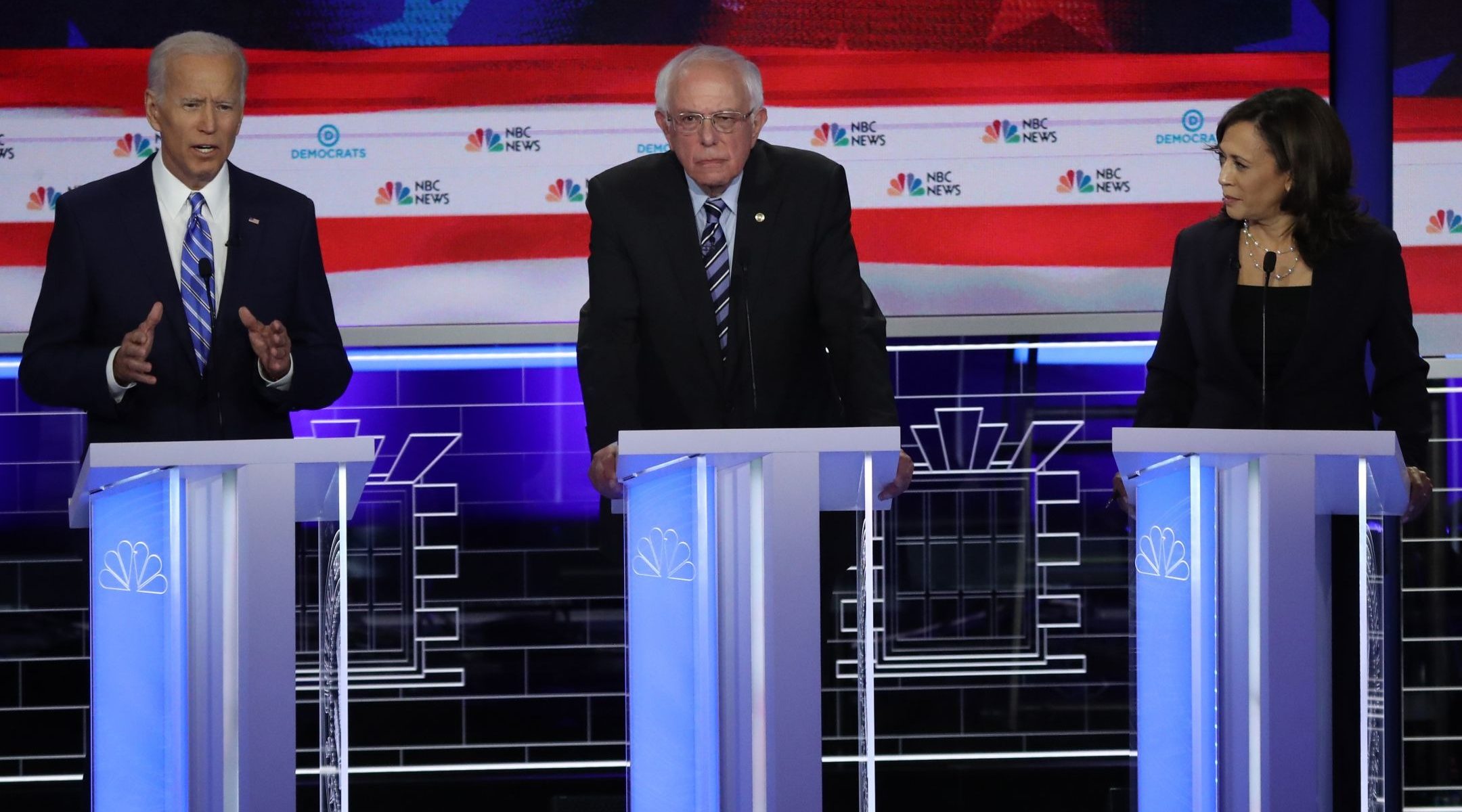 Sen. Kamala Harris (R) (D-CA) and former Vice President Joe Biden (L) speak as Sen. Bernie Sanders (I-VT) looks on during the second night of the first Democratic presidential debate in Miami, Florida on June 27, 2019. (Drew Angerer/Getty Images/JTA)
Sen. Kamala Harris (R) (D-CA) and former Vice President Joe Biden (L) speak as Sen. Bernie Sanders (I-VT) looks on during the second night of the first Democratic presidential debate in Miami, Florida on June 27, 2019. (Drew Angerer/Getty Images/JTA) WASHINGTON (JTA) — The most dramatic moment in the second Democratic presidential debate was a showdown about race and generational differences between front-runner Joe Biden and Sen. Kamala Harris, D-Calif.
In a debate that focused heavily on immigration, health care, income equality, civil rights and taxation policy, foreign policy barely featured Thursday, in part because the NBC moderators did not emphasize it as much as they did when a separate tranche of 10 candidates appeared on the stage the night before.
Tensions with Iran, which featured prominently on Wednesday, came up only a handful of times on Thursday and only because two among the 10 candidates on stage raised the issue.
The former vice president, 76, appeared wounded and uncertain during the exchange Harris initiated over his record of praise for segregationist senators with whom he once worked to advance legislation, and his opposition in the 1970s to busing as a means of desegregation.
“I do not believe you are a racist,” Harris, 54, said, directly addressing Biden. “And I agree with you when you commit yourself to the importance of finding common ground, but I also believe — and it is personal, and it was actually very hurtful to hear you talk about the reputations of two United States senators who built their reputation and career on the segregation of race in this country. And it was not only that, but you also worked with them to oppose busing. And you know, there was a little girl in California who was a part of the second class to integrate her public schools, and she was bused to school every day. And that little girl was me.”
Biden, who was for decades the senior Delaware senator, tried to argue that busing was often a local decision, but Harris noted his record of opposing federal enforcement of desegregation. Biden has so far been by far the front-runner, while Harris’ polling has been in the middle tier of candidates.
The exchange, at least according to the cable TV pundits commenting on the debate, made Harris the evening’s winner. Her campaign immediately posted on Twitter a photo of her as a child, captioned, “There was a little girl in California who was bussed to school. That little girl was me.”
President Donald Trump’s campaign team, which until now barely had paid attention to Harris, immediately launched attacks on Twitter. In one instance, their feed pointed to a CNN town hall earlier this year where Harris said she was open to prisoners being allowed to vote.
Iran had featured large in the Wednesday debate when nine out of 10 of the candidates who were on the stage said they would reenter the nuclear deal with Iran that Trump abandoned a year ago. (Only Sen. Cory Booker, D-N.J., said he would not automatically rejoin the deal.)
It came up just twice on Thursday night, when moderators asked candidates what their first acts as presidents would be. Sen. Kirsten Gillibrand, D-N.Y., said she would seek to tamp down tensions with Iran, exacerbated in recent weeks after Iran downed an unmanned U.S. drone, and Trump came close to a lethal retaliatory strike on an Iranian target, only to pull back at the last minute.
“President Trump is hell-bent on starting a war with Iran,” Gillibrand said. “My first act will be to engage Iran to stabilize the Middle East and make sure we do not start an unwanted, never-ending war.”
Sen. Bernie Sanders, I-Vt., also said his first focus would be the Middle East and sought to distinguish himself from Biden, who supported the 2003 Iraq War. Sanders often ranks second or third in polling, behind Biden.
“One of the differences that Joe and I have in our record is Joe voted for that [Iraq] war, I helped lead the opposition to that war, which was a total disaster,” he said. “Second of all, I helped lead the effort for the first time to utilize the War Powers Act to get the United States out of the Saudi-led intervention in Yemen, which is the most horrific humanitarian disaster on Earth.” Trump vetoed the congressional bid launched earlier this year by Sanders to stop U.S. support for Saudi Arabia’s war in Yemen.
“And thirdly, let me be very clear. I will do everything I can to prevent a war with Iran, which would be far worse than the disastrous war with Iraq,” Sanders said.
The Trump campaign Twitter feed, called Trump War Room on Twitter, posted an attack on Democrats for not mentioning Israel or the increase in anti-Semitic attacks. “Two nights, four hours, 20 candidates and still ZERO mentions of threats to Israel or the menace of anti-Semitism,” it said.
Biden did attack Trump for his remarks after a deadly neo-Nazi march in Charlottesville, Virginia in August 2017, when he said there were good people among the marchers and the counterprotesters.
“I’m ready to lead this country because I think it’s important we restore the soul of this nation,” Biden said. “This president has ripped it out. It’s the only president in our history who has equated racists and white supremacists with ordinary and decent people.”
Sanders and Marianne Williamson, a self-help author, were the Jewish candidates on the stage. Sen. Michael Bennet, D-Colo., does not identify as Jewish but often notes that his mother is a Holocaust survivor, and did so again at Thursday’s debate, talking about the Trump administration’s policy of separating migrant children from their adult relatives.
“When I see these kids at the border, I see my mom, because I know she sees herself because she was separated from her parents for years during the Holocaust in Poland,” Bennet said.
The other candidates on stage Thursday were Rep. Eric Swalwell, D-Calif., former Colorado Gov. John Hickenlooper, South Bend, Indiana Mayor Pete Buttigieg, and entrepreneur Andrew Yang.
On Wednesday night, in addition to Booker, the candidates appearing were Sen. Elizabeth Warren of Massachusetts, Sen. Amy Klobuchar of Minnesota, Rep. Tim Ryan of Ohio, Rep. Tulsi Gabbard of Hawaii, former Rep. Beto O’Rourke of Texas, former Rep. John Delaney of Maryland, former Housing Secretary Julian Castro, New York Mayor Bill De Blasio and Washington Gov. Jay Inslee.























 More news and opinions than at a Shabbat dinner, right in your inbox.
More news and opinions than at a Shabbat dinner, right in your inbox.